Read

Nicolas Lagneau:
Elderly Man Reading a Book (C.1650)
" … one can be fairly certain it isn't …"
What does a writer really do? This kind of question seems useful, whatever the profession, for professions notoriously label themselves as something other than the professional's primary occupation. A cook might spend considerably more time prepping than cooking. A typical astronaut might spend less than 1% of their time actually astronauting, the balance spent primarily in training. Surgeons can only spend a few hours each day in surgery and expend the balance of their days engaging in all the ancillary activities attendant to performing surgery: diagnosis, evaluation, follow-up, consultation, etc. Nobody actually does what they're advertised as doing, not primarily, and a writer's no exception. So what do writers do in lieu of writing? They read.
Every book I've ever read about how to become a writer prescribed precisely the same regimen: Read.
Poifection
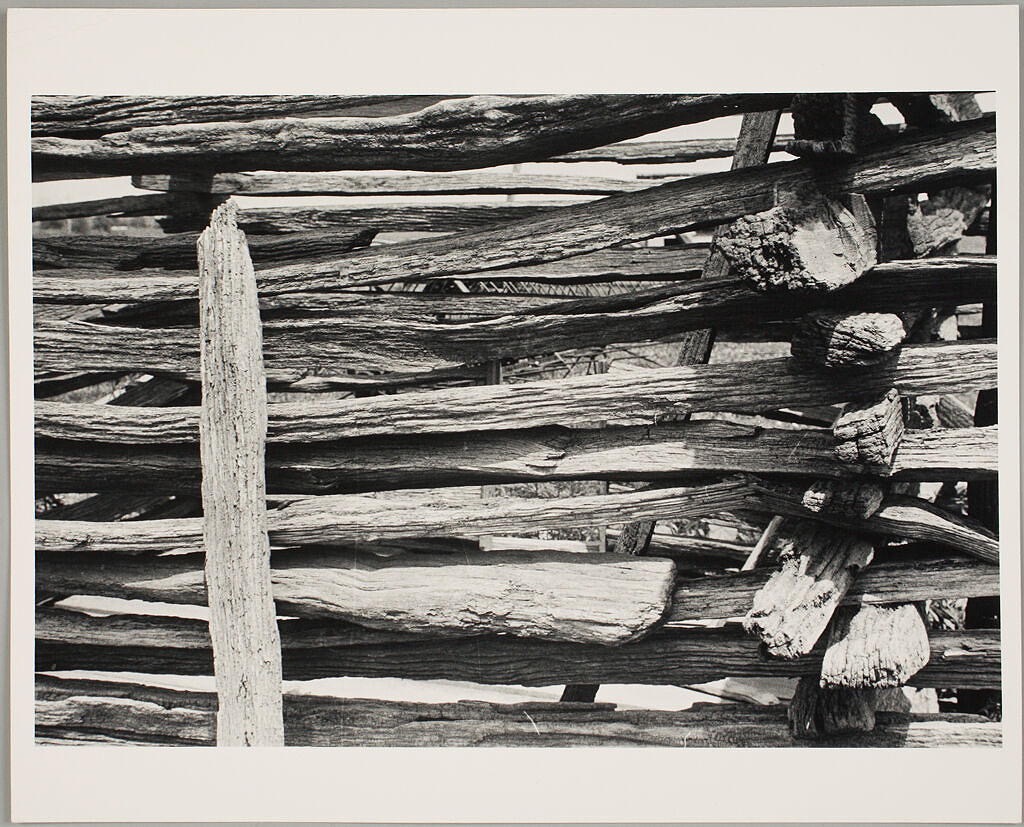
Ben Shahn:
Detail of a log fence in central Ohio (1938)
"It must have been a form of magic …"
Nothing amplifies a sense of accomplishment like a long lead-up. Finish anything quickly and effortlessly, and little sense of elation accompanies the closure. Struggle over it, though, and it seems like a very big deal, indeed. Even the more evident and normal surface imperfections might seem to disappear in the shadow of the resulting joy. And so it seemed for this dreamer who set out to publish one of his works into something resembling a book. He learned that books do not just happen, nor are they the inevitable result of the concatenation of individual parts. They must be crafted, reworked, and reimagined, whatever their original form or concept. Much picky work and many unexciting details combine to finally produce something resembling a finished product. There's even more effort required after, but the appearance of something resembling a book works as a new beginning, a platform from which further adventures might resume.
I somehow managed to stumble upon the secret, that magic something allowing me to proceed to Go and collect my obligatory Two Hundred Dollars.
PickyDetails
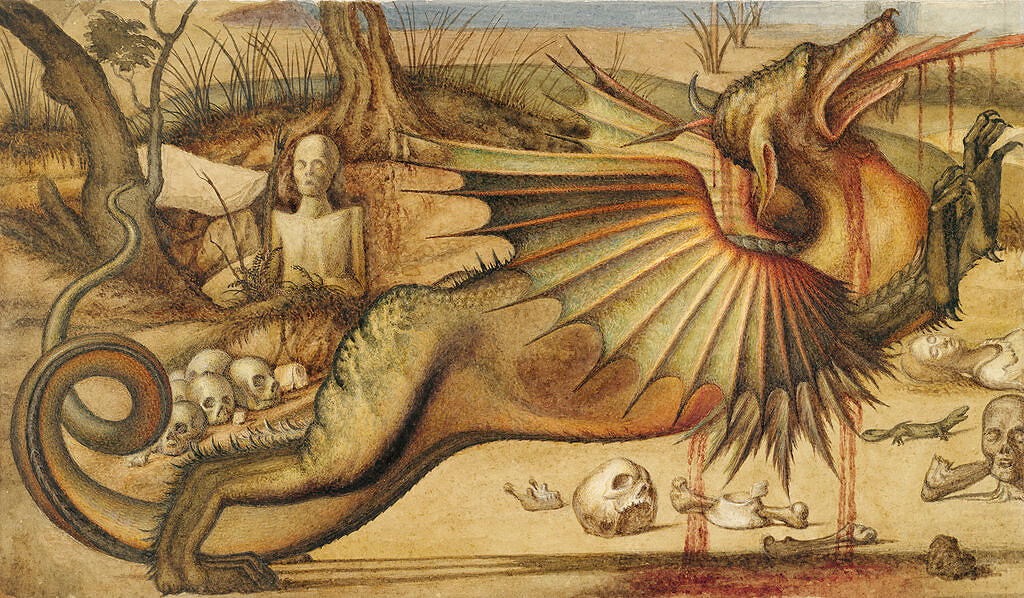
Charles Herbert Moore,
Copy after Vittore Carpaccio:
Much Reduced Study of the Dragon in
Carpaccio's Picture of St. George and the Dragon,
in the Chapel of S. Giorgio dei [sic] Schiavoni, Venice, 1876
"I'll never be much more than not quite a rank amateur …"
Once assembled, my manuscript must be printed before one more round of rereading and review. The formatting's not quite right, meaning I've entered the long-dreaded PickyDetails part of this Publishing process. I've long dreaded this stage because I have not even nearly mastered my manuscripting software, which seems by any measure an absolute behemoth. It does too much for any app even to attempt. Being a purported master of so many realms, the user who seeks no more than an informal relationship seems sunk from the outset. A unique vocabulary seems at least necessary to make any headway, and I still have not begun to master even a pigeon-English dialect for this one. The app comes with hours of detailed tutorial videos which introduce the app in curious slices. These videos induce sleep better than a bootleg prescription of Nembutal. Five or six years of experience with this app still leaves me well within the Naive User classification.
The question comes down to how I might accomplish this.
Onward&Inward
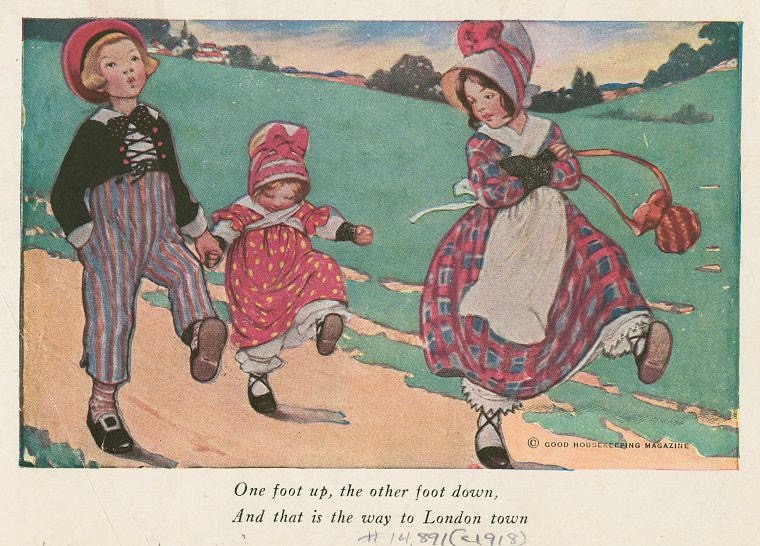
Jessie Willcox Smith:
One foot up, the other foot down (1918)
" … exclusively produced by fools like me …"
Two months later, I stumbled across a finish line of sorts. I finally put together that manuscript I started assembling sixty days ago. This achievement amounts to more of a milestone event than a finish line one, for many subsequent steps remain along paths as yet clearly charted. I do not yet understand where this thread continues, just that I'm not at the end of it yet. However, this event still feels momentous, for assembling this bugger was a genuine struggle. Much of the effort required patience, a commodity perennially in short supply, especially when and if one's anxious to finish. The more one wishes to accomplish something, the more difficult it becomes to achieve. I suspect that if I could only become indifferent to accomplishing anything, my life would become a breeze, but without enough passion to sustain anyone, let alone me. Besides testing dedication, frustrations help maintain momentum and purpose. I've made progress! Sixty-six thousand, nine-hundred and ten words, projected to produce three hundred and thirteen pages when printed. Estimated reading time: four hours and forty-seven minutes.
Next comes some different challenges.
MixingMetaphors
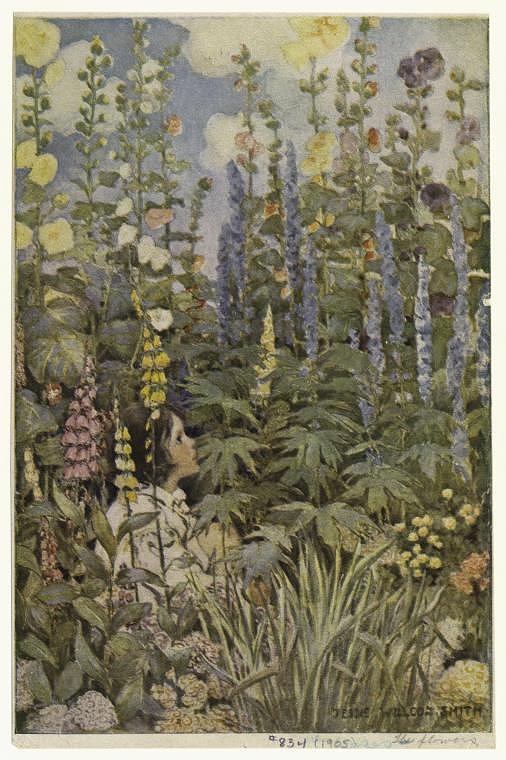
Jessie Willcox Smith:
Girl seated in flower garden (1905)
"Beware of good advice and even warier of better."
As I assemble my manuscript, I catch myself unable to imagine its contents. Yes, I wrote every word, but even after creating each story and reading through each several times, I cannot quite bring to mind most of its contents. I carry a general impression of whatever's between the covers, but the details escape me, or they would escape if they'd ever been captive. I sense that I might be especially stupid to find myself unable to crisply recall what I've written. When I reread a story, I quickly realized it was mine. I recognize the voice. I usually even recall the context within which each one emerged, but I'm almost at a loss to describe much of the manuscript's contents absent that prompting. I consider this a serious shortcoming.
Like all advice-givers and consultants, I once encouraged my clients to start with a singular focus.
Introduction

Jessie Willcox Smith:
Heidi introduced each in turn by its name to her friend Clara (1922)
The Introduction tends to be the last chapter written and the first one read. The author might have drafted an Intro as at least a placeholder before writing the contents. That one better represented the writer's intentions but intentions rarely survive encounters with a keyboard. Like every paper you tried to write to the outline you were instructed to create before you started writing, writing takes intentions in different directions. By the time the author's finished writing, he holds a firmer impression of who he's become while creating the manuscript. More likely, it won't be until after he's finished assembling the manuscript before he finally manages to catch up with himself and affect some sort of Introduction. By then, he will have become different from the aspiring author he was at the beginning and even different from the more seasoned hack he became after he'd finished writing. The proofing and sequencing effort couldn't have helped but change more than just his perspective. It changed him into someone needing an Introduction to himself.
I have watched myself as I've crawled through this latest manuscript assembly.
WritingSummary: 4/25/2023
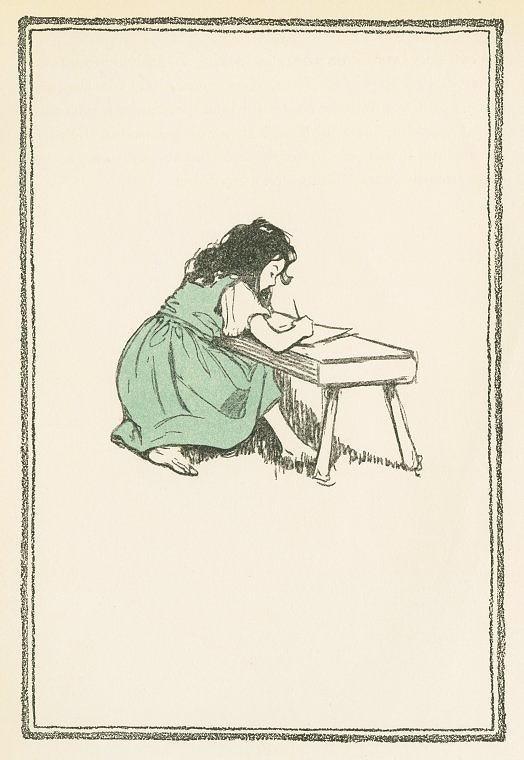
Jessie Willcox Smith: Heidi writing (1922)
Refreshed if Groggy
I primarily create my weekly writing summaries for myself. I need the reminder of how I have spent my week, of what I've discovered. Once written, an insight's quickly forgotten, buried beneath subsequent discoveries. As I've assembled my latest manuscript, I have discovered plenty. I've been continually stumbling upon identities I'd forgotten I'd ever assumed, stories written in stone but still somehow lost, bits and pieces needing connecting. These stories do not just connect themselves. Connection requires deliberation, focused attention, and clear intentions. I catch myself over-anticipating creating these summaries. Come Thursday, I foresee a lengthy effort coming Friday morning. Often, something happens on Thursday that leaves me late to bed. The alarm rings almost viciously come early Friday morning. Still, I finish the summarizing effort, pleased with myself for having done it, for it marks a milestone as I create my next manuscript. I start my new writing week refreshed if groggy, clearer about my recent history, and ready to proceed into the upcoming unknowns.
Resolute
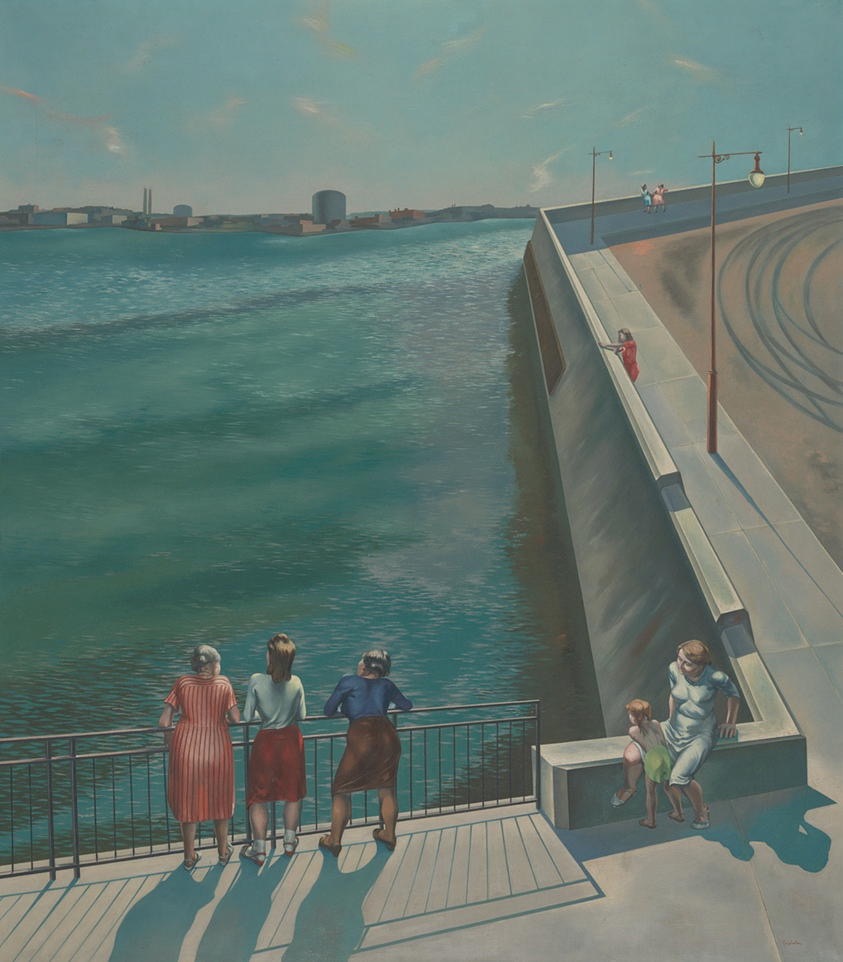
O. Louis Guglielmi: The River (1942)
"Where another inertia ruled the start, its counterpart commands the finish."
I can't fairly characterize myself as relentless, but beyond a certain uncertain point, I have known myself to turn Resolute. This Publishing business, for instance, which has turned out to hold far more dimensions than I at first suspected, has left me feeling, in turns, helpless and reassured, overwhelmed and bored stiff. It has offered a gauntlet of negative reinforcement and many must-dos between the beginning and realizing my aspiration. I'd even gladly bartered away my beginning naivety for a better story once I realized that I could hold my dream or realize something tangible, but not both. Now that I'm down to the final few weeks of the planned excursion, I've grown more comfortable with the intrusion. I can sense an impending resolution; I swear that I can smell it now. Downwind of resolution, I might just as well turn Resolute.
My schedule, sometimes my staunch opponent, has now become my ally.
TwoMillionPlus

Giovanni di Paolo:
Saint John the Baptist Entering the Wilderness (1455/60)
"… we periodically pretended together that it was."
I claim to be a political Progressive, meaning I subscribe to the curious notion that progress remains both possible and net positive; unlike political Conservatives who view their future skeptically, often cynically, as if it serves as a descent from prior greatness, Progressives claw ever forward. In contrast, Conservatives seek to return to past glory. We cannot possibly experience either perspective, what with entropy and all, but they're belief structures, not intended to represent reality but to harbor aspirations. As a Progressive, I hold lofty aspirations. My Conservative neighbors seem to hold more catastrophic ones. It comes down to what sort of future I imagine since an actual future has yet to manifest and perennially can't.
The question of progress made and experienced eventually enters into every human activity.
Joystaking
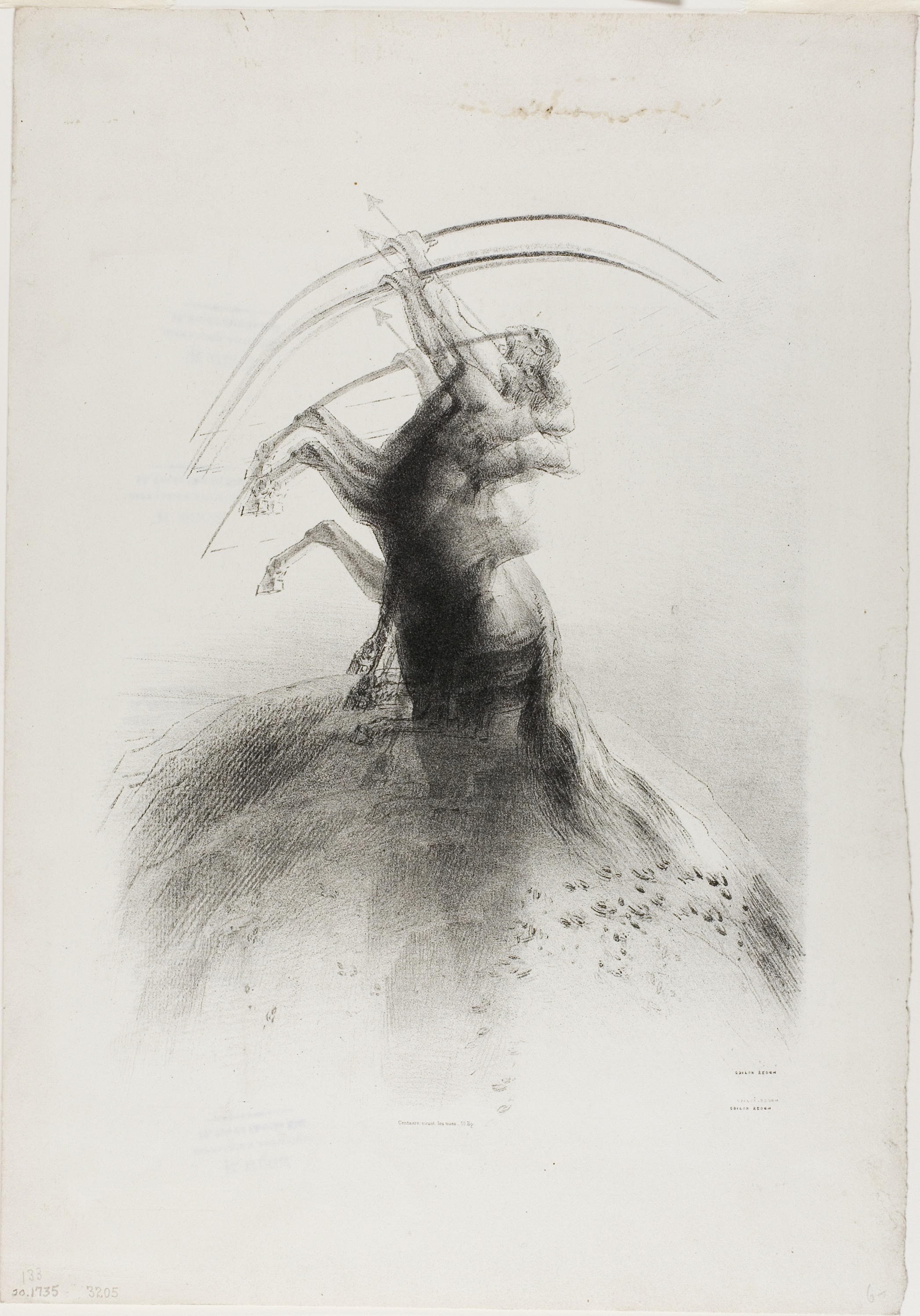
Odilon Redon: Centaur Taking Aim at the Clouds (1895)
"Edit with a light heart."
I might fairly characterize much of Publishing as painstaking, but that term connotes the wrong sense. The work should not evoke pain, for it seems the soul of the Until It's Fun, It's Better Left Undone sort of work, best not thought of as work at all but play. With all the picky copying and pasting, copyediting and formatting, reading then reading again before proofreading one final time, any of this effort could easily seem dreary, long lonely slogs through barren territory. It comes in pieces and remains as disjointed pieces through most of the process intended to transform raw writing into something finished, but the manuscript takes on the spirit of whoever engages in creating it. If the assembling's drudgery, so the finished work shall be. The manuscript becomes the heritage of whatever vibe created it.
So painstaking might properly characterize the assembler's careful focus, but it connotes the wrong feeling.
MysteryWithin
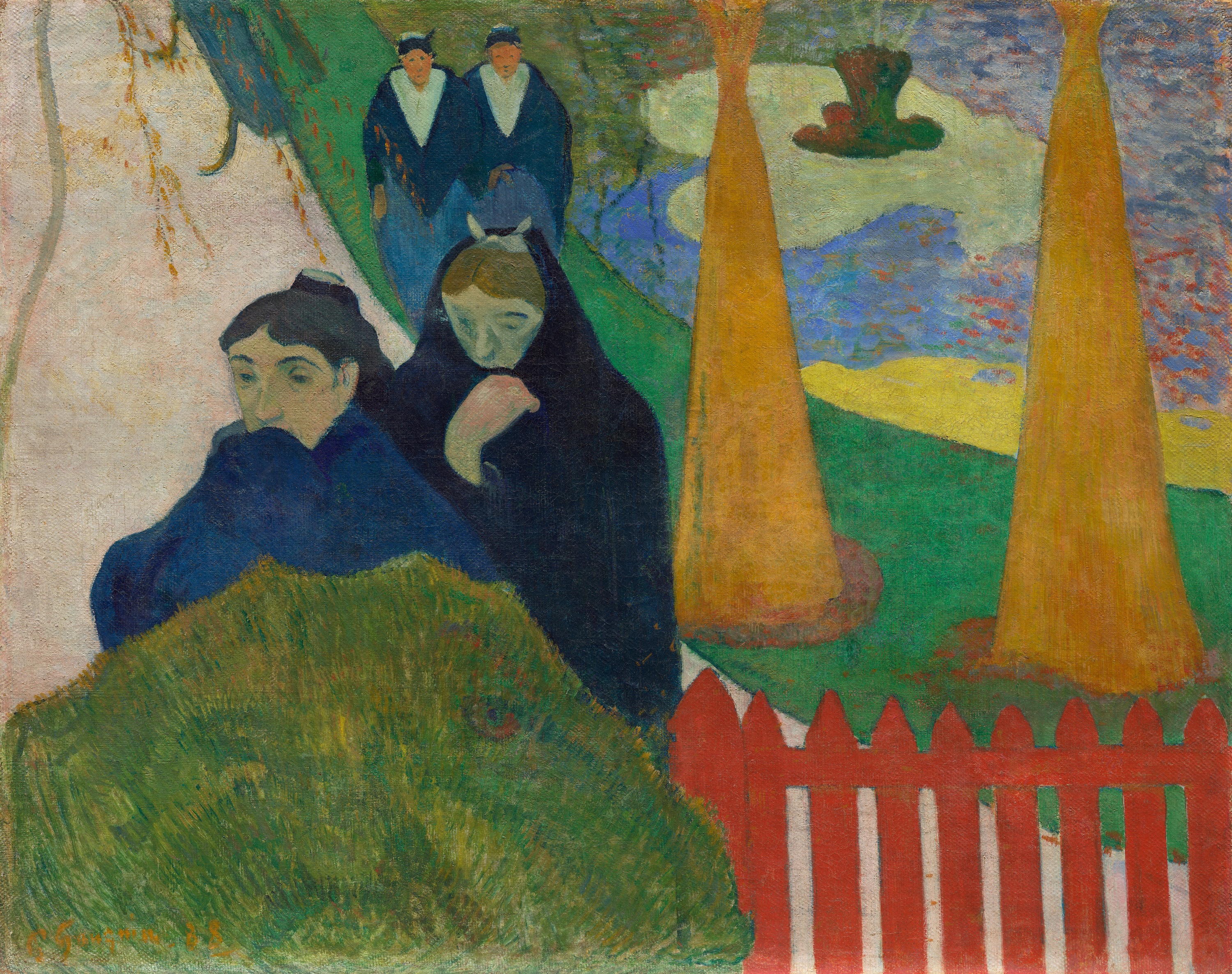
Paul Gauguin: Arlésiennes (Mistral) (1888)
"He always was before."
I dreamed I was solving a mystery. Clues appeared before me, and I dutifully tracked them down, slowly building my case. Just when I felt as though I might be getting close to identifying the guilty parties, a thought visited me, an idea that, just for a second, wondered who was writing the story. Was I solving a mystery or staring in a story where I was cast as the detective, not really solving anything but more like serving as an author's character in some work of fiction, my role not real but made up. I considered shifting my focus then from merely acting as a mystery solver to chasing after the deeper mystery to see if I could identify who was this author. I received surprise testimony from a woman who claimed to be the actual author's mother, but even she needed help determining which part of the puzzle was figure and which was serving as ground.
I remember happening upon helpful strangers, of feeling baffled just before, as if by fortunate accident, fresh useful information came into my possession.
Clicks
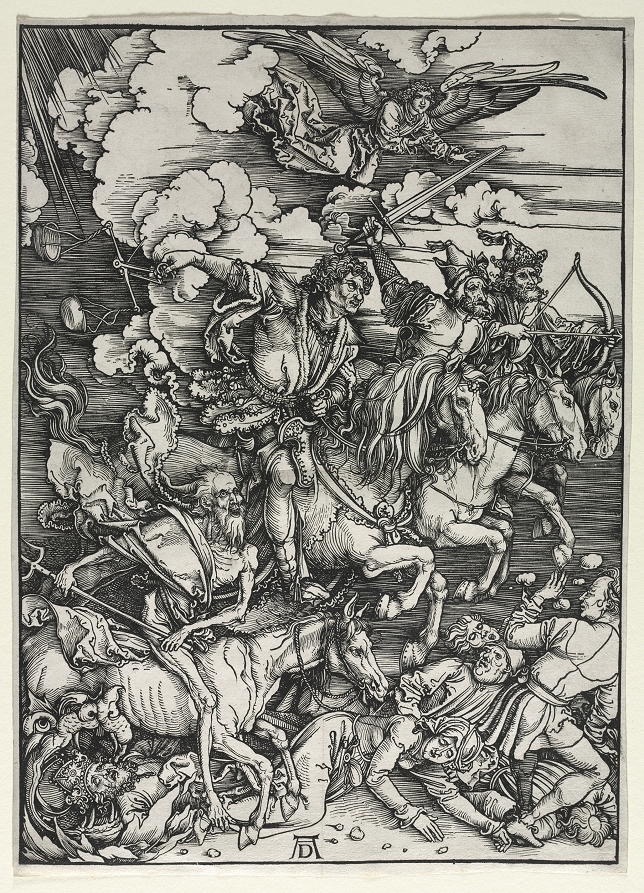
Albrecht Dürer:
The Four Horsemen, from The Apocalypse (c. 1498)
"How do I compare thee to a provocative headline?"
The cynicism in this world expands at an ever-expanding rate. What passed for crass fifty years ago will hardly make noteworthy today. From Fuck Biden bumper stickers to clickbait social media headlines, today's world trades in raw attention—the less refined, the better. Publishing, too, has fallen prey to these emerging values—if I dare use value to describe what I see happening inside. Almost twenty years ago, some brilliant upstart experienced a revelation. Where Publishing had forever focused on distributing content as its purpose, an emergent goal appeared: attention. On the internet, the Click became the metric and the purpose, and everything was or would eventually be distributed via the internet. A hollow piece with an attractive title would easily attract more attention than any unprovocative, thoughtful piece. First one, then almost all others began focusing their attention upon attracting attention, upon encouraging Clicks. The brilliant insight centered around the realization that Clicks pay, but content doesn't.
At first, It didn't matter how long attention focused on any individual item.
Obswerving
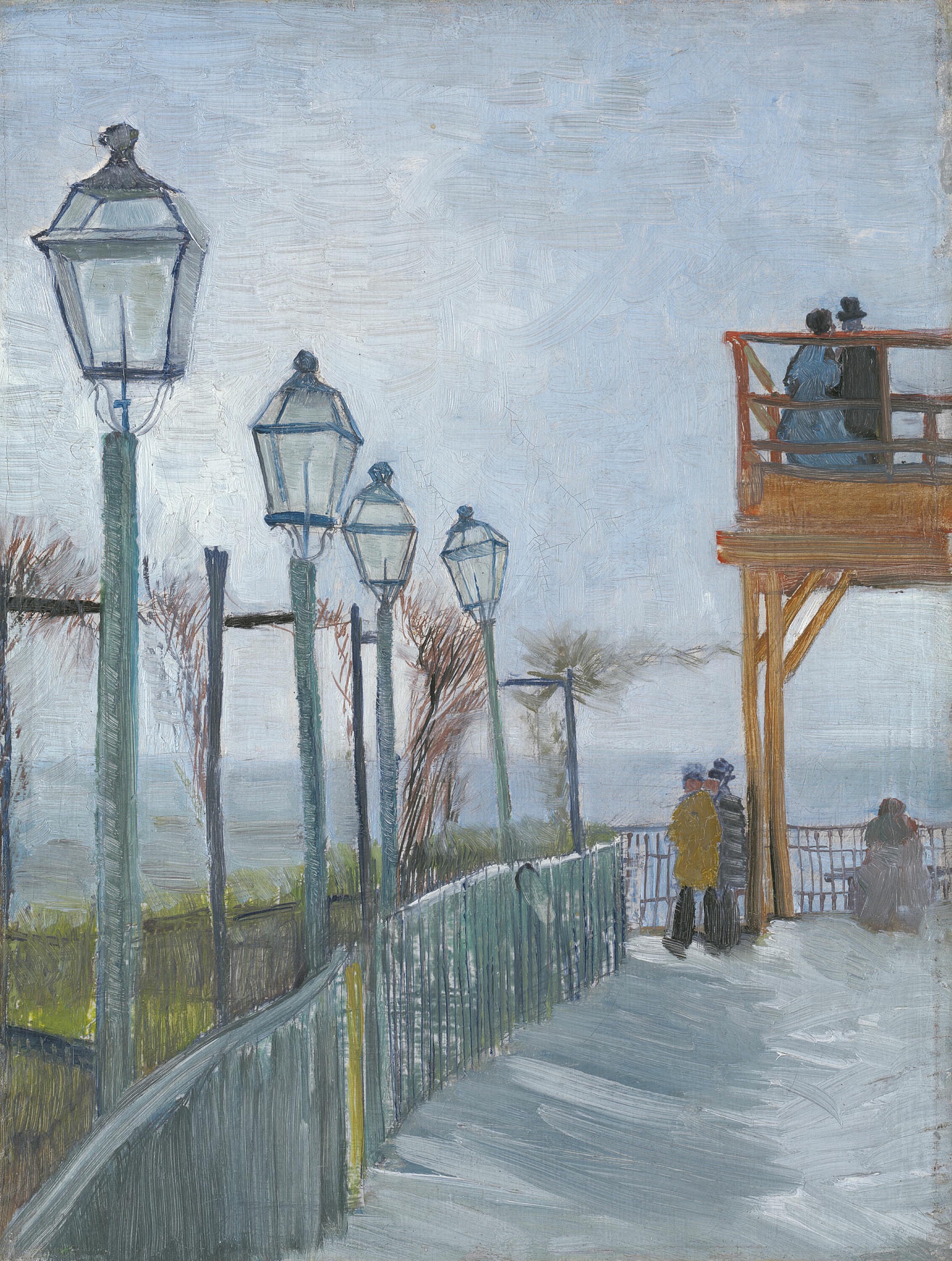
Vincent van Gogh:
Terrace and Observation Deck at the Moulin de Blute-Fin, Montmartre
(early 1887)
"The finished work isn't finished …"
I claim to be writing a series about Publishing, but I've grown increasingly uncertain if this effort will produce what it initially implied. I know, I know, that bait-and-switch suggestion might qualify as the subtext of this whole series so far. I can hardly pick up a stick but what that stick transforms into something else, or sure seems to. Iterate that experience a few dozen times, and anyone might come to question the basis upon which they'd drawn their conclusions. The jury might opt to continue deliberations and might not ever come to any firm conclusions other than that the case was clearly not as presented and not really as expected, either. It turned into something different.
Could I once, just once, leave well enough alone?
WritingSummary: 4/18/2023
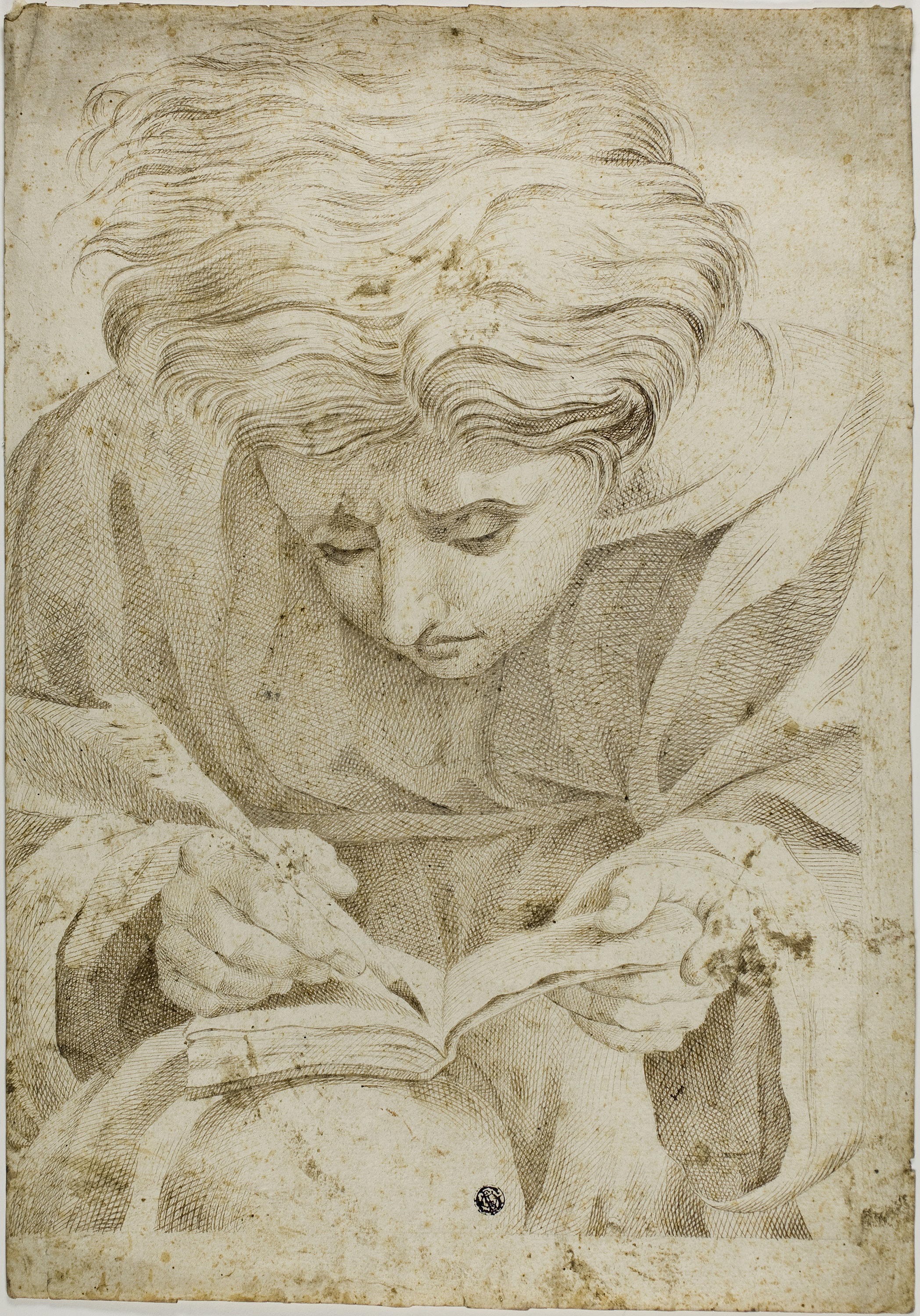
After Raffaello Sanzio, called Raphael:
Seated Youth Writing in Book (17th/18th century)
Thrive On The Unresolvable
This week brought me back into my regular writing schedule after missing parts of three writing weeks. I had worried that I'd broken the trance that usually carries me into and through my writing work. I can be superstitious about my habits, mistaking them for necessary imperatives when they're more likely no more than random patterns. I learned—or I am still learning—that I need not necessarily fear upsetting my patterns. I am no longer the sum total of the habits I keep, for I have been actively breaking bad habits in favor of better ones, so far, without evident damage. In my relative youth, I might have been addicted to my life, convinced of the necessity of so many of my choices. One of the great gifts aging brings seems to be a loosening of those encumbering imperatives. I increasingly see that I am unnecessary, though I might still qualify as nice-to-have. I am no longer necessary if I ever was; my stories are not what they seem. It might be that our purpose here was never to resolve any great mysteries but to discover more of them. This world seems to thrive on the unresolvable.
Piles
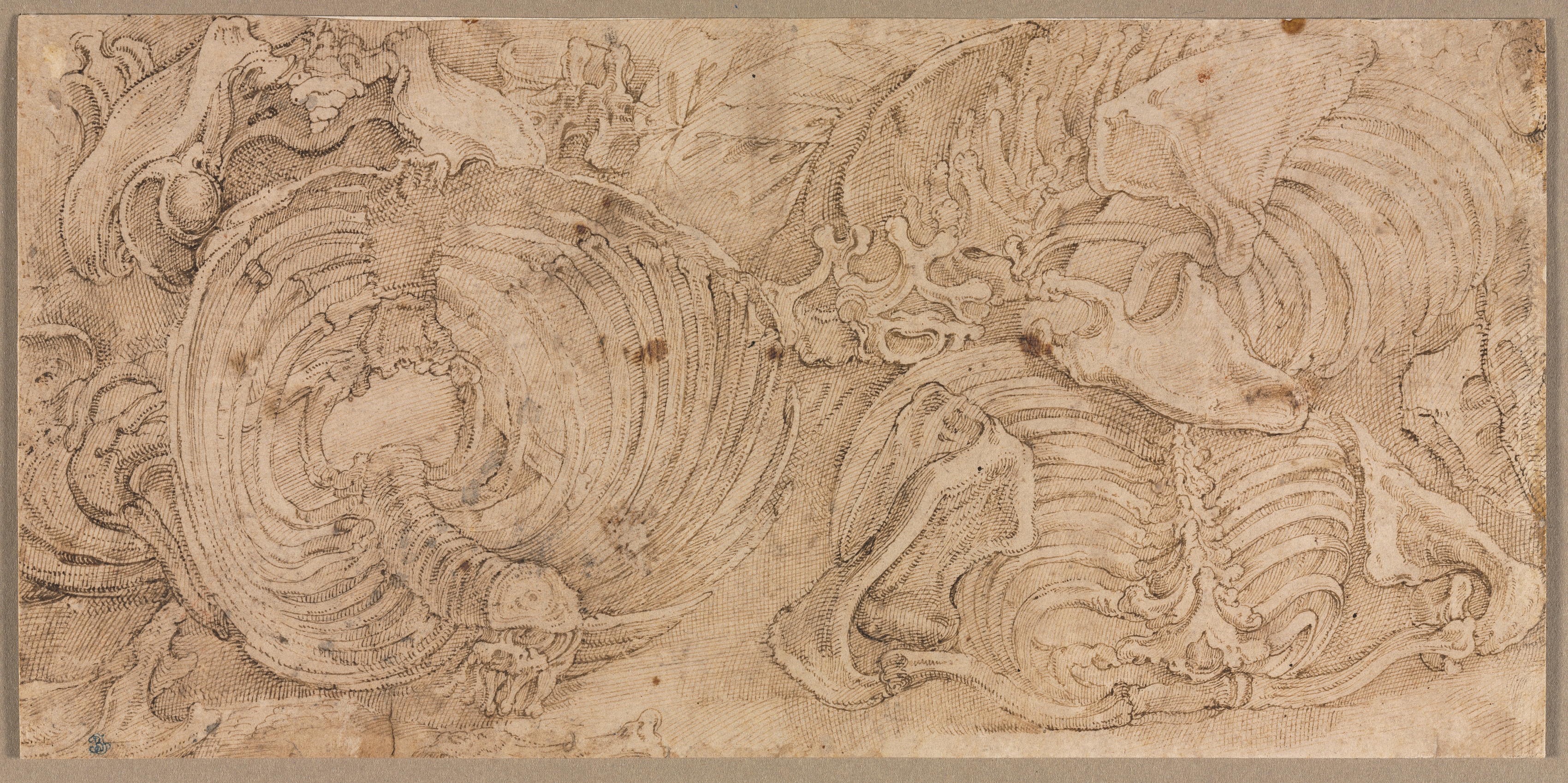
Battista Franco: Rib Cages (early 1540s)
"Delusions like this one keep me moving forward."
One can tell a lot about an artist by learning how they organize their work. I utilize the venerable Pile, which started as a page, and emerged from an inadvertently random-access filing system. My legitimacy was always suspect because of the primitive methods I employed to keep track of my output. For me, Publishing attempts to right this error, to finally put form to what emerged almost randomly. My great sin as a writer and creator has always been that I have never understood what form my collected works might eventually take. I failed to properly anticipate. I'd produce a word, then a sentence at a time without deeply considering where I might store the product or what structure might best serve my someday heirs and archivists in the unlikely event that I left either behind. I'd pile one page upon another until the pile threatened to tip over, then I'd start another pile. Fifty years later, my library looks like an abandoned recycling center.
Fortunately, most of my pages and Piles are virtual.
Symmetry
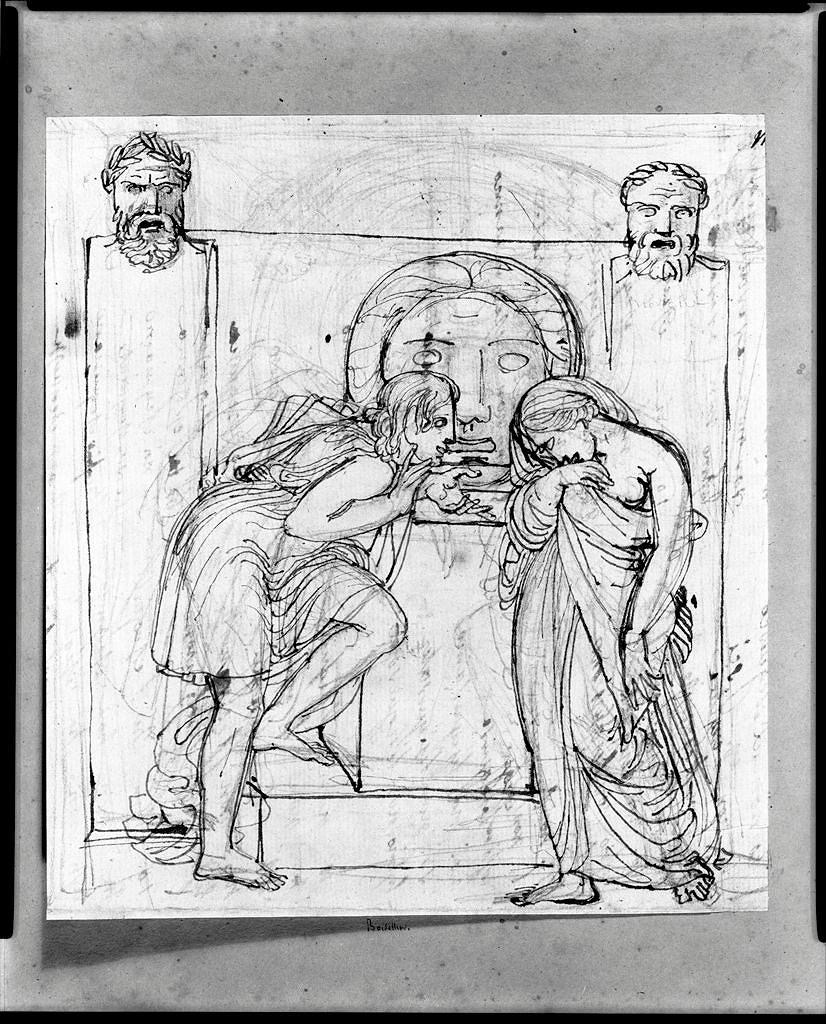
Félix Boisselier: The Mouth of Truth (1809-1810)
"When beauty appears, remaining questions disappear."
"It was a poet, not a scientist, who claimed that beauty was truth and truth beauty, but neither beauty nor truth are sufficient to sustain, let alone understand life as it is lived. There is a certain symmetry even to the bit of broken fence in my neighbor's yard, which convinces me that it is both real and functional enough to not need any added elegance that might be found from fixing it." PureSchmaltz - Integration: Symmetry- 11/04/2009
A point finally comes when the emerging manuscript takes on the appearance of a manuscript. The troubling formatting details, often the final mystery to resolve itself, finally come together, and the final pattern of the work manifests. This comes as both a shocking and a subtle experience. I might not notice until a while after since I have been immersed in the most trance-inducing work of the effort. I repeat the patterns until their eigenvalue emerges, beyond which every fresh addition automatically aligns with every other. Even the illustrations find consistency in their presentation and placement. The work, forever in pieces, finally becomes whole.
This form was not the result of deliberate design but its second cousin. Iteration, starting blind, then moving ever more closely into an alignment, formed a kind of evolution.
Repurposeful
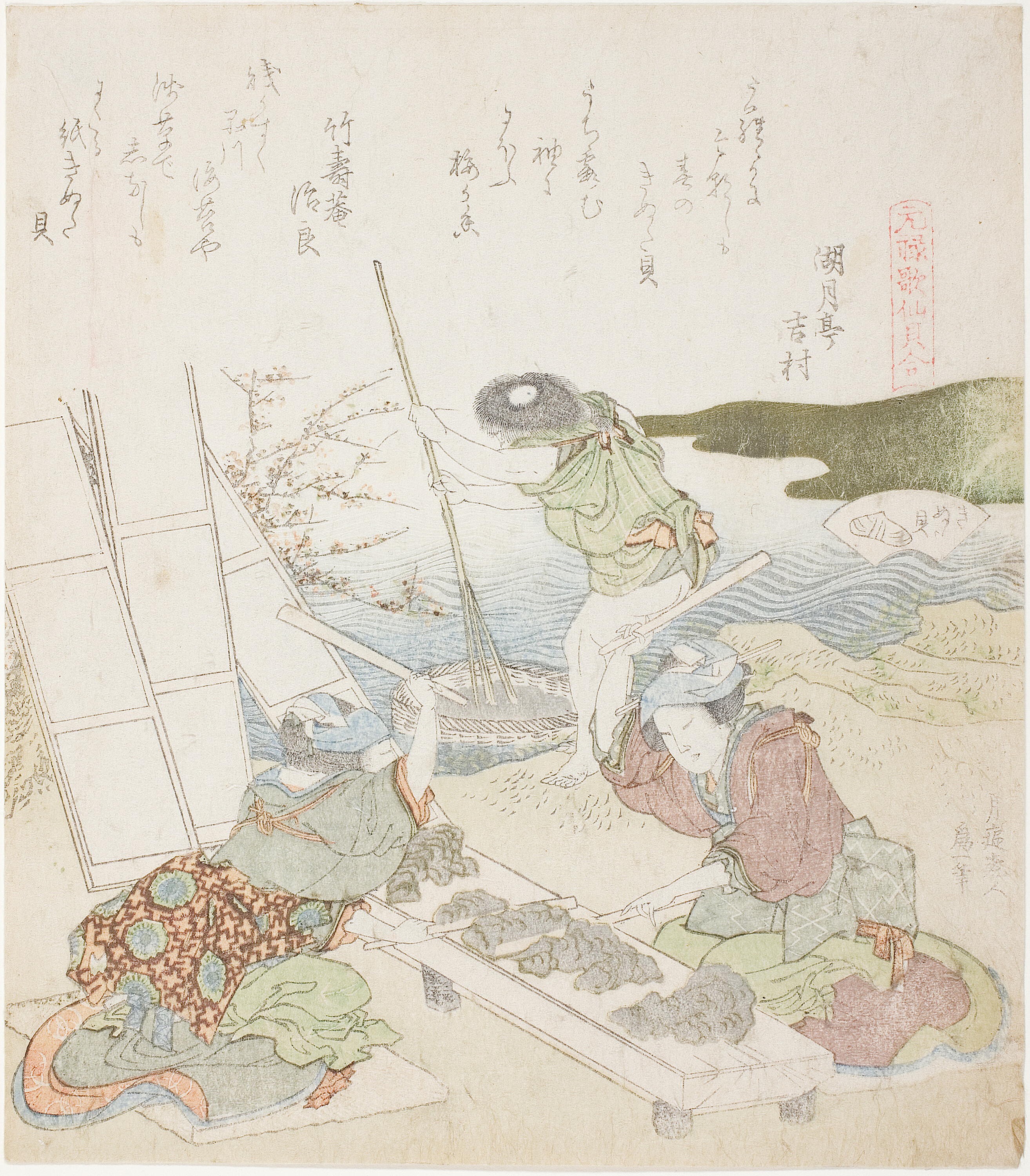
Katsushika Hokusai 葛飾 北斎: Recycling Paper (1821)
"I repurpose and therefore am."
By the time this story becomes part of a manuscript, I will have repurposed it several times. The manuscript itself might have always been the purpose of creating the story, but each seemed to need several interim iterations before I could quietly put it to rest there. It first appeared as a part of my daily production, my each and every morning writing practice. This initial iteration sure seems finished when I first post it, but it needs fixing before it can reach anything even remotely like its final destination. I often wonder if I could simplify this terribly complicated and intricate process until I recall that this present instance represents years of evolving improvements. The process isn't yet completely static, but it's become both much simpler and more complicated as various purposes have emerged and stuck into more or less permanent practices. I've become a Repurposeful writer, poster, and publisher, reworking essentially the same kernels to satisfy their varying purposes.
Much of this effort amounts to relatively mindless copying and pasting.
Distracting
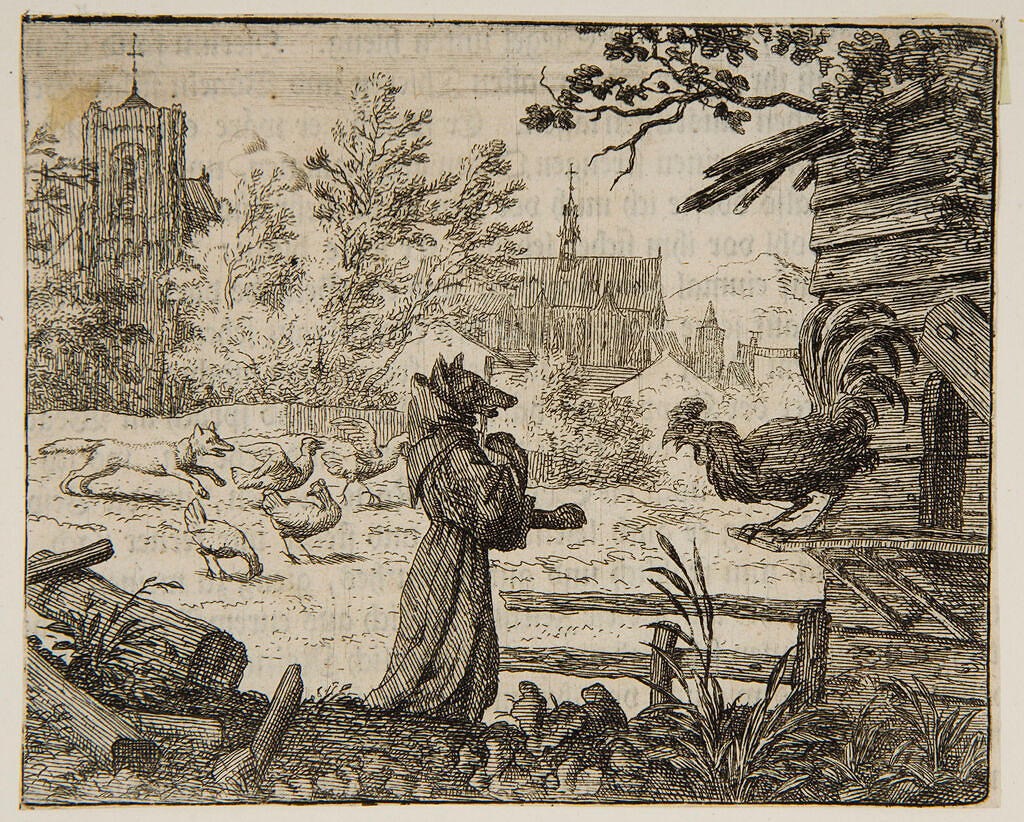
Allart van Everdingen:
Reynard disguises as monk and distracts cock
(17th century)
" … few intentions seem very far beyond us."
Publishing sure seems like an occupation especially designed to try a practitioner's patience. Every damned thing involved in the engagement takes longer than expected and ultimately seems more complicated than strictly necessary. Still, under the It Takes Whatever It Takes Rule, I cannot characterize even these demands as excessive. They simply refuse to align with my tastes. Someone somewhere would very likely find this work rewarding, but probably nobody who'd ever very likely find themselves actually asking to engage in it. Some professions seem just like this. They seem the exclusive domains of misanthropes, those who never hoped to find their gainful employment shipping out beneath those masts. Dies cast as they cast. I might just as easily insist that I've been blessed with my Publishing mess.
I lack sufficient discipline to make the headway I had been expecting, though, as with many things, I suspect my metaphor's lacking.
Skeptical

Thomas Cowperthwait Eakins:
Miss Alice Kurtz (1903)
" … who once upon a time left a few utterly ordinary stories behind …"
I'm not much of a Booster. I'd make a piss-poor Rotarian, Kiwanian, or member in decent standing of the local Chamber of Commerce. My father before me stood off to the side, not precisely hiding but actively trying not to become the center of anyone's attention. The salesmen and hail fellows gladhand their way through their lives while others stand aside and gladly bid them pass by, for they seem to be on some mission. They're going somewhere, sure and certain of their own salvation, and excited at the prospect of improving others' chances, too. They seem to hold God's ear, his attention, with the explicit intention of collecting their due.
I feel uncertain whether I'm on a righteous path.
Confidence

Adélaïde Labille-Guiard:
Portrait of Dublin-Tornelle (c. 1799)
"How could any of us ever experience the considerable benefits of our doubts if we've smothered them with our Confidence first?"
Confidence proves neither necessary nor sufficient to support any creative endeavor. It more often undermines an artist, who might find himself better served by slathering himself in criticism or doubt, for Confidence accentuates the positive at the onerous cost of other perspectives. It too easily evolves into studied self-deception, unshakable notions, and devotion to lesser Gods who grant unearned permissions and the pursuit of unwarranted commissions. One too easily falls into playing the Confidence Man, so practiced at self-deception that deception becomes first nature, trading in hollow and narrow platitudes, knowing for certain what nobody could ever know for sure, selling soap and Bibles.
The Confident author might not be worth reading other than as an example of what one should avoid reading.
Outlying
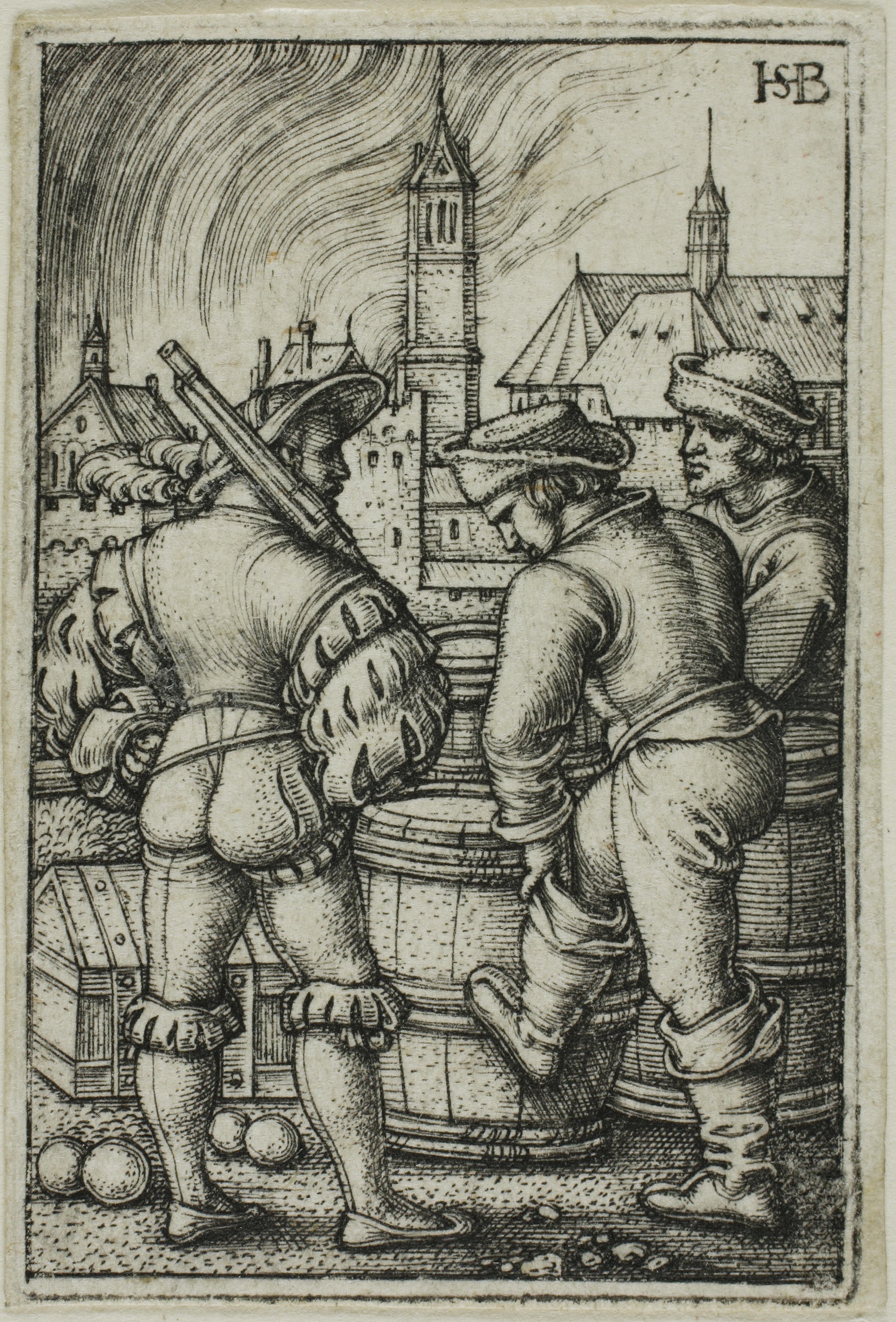
Sebald Beham:
The Guard Near the Powder Casks
(Not Dated, c. 1520-1550)
" … my books look different than most others."
Each publication should be different than anything published before it. Not necessarily radically different, but just different enough. Nobody, for instance, really wants their New York Times to arrive looking like a tabloid Post or US News, for that difference makes little sense. So, superficially, each edition of The Times should appear, from a slight distance, almost precisely the same as every other, though once a decade or so, something so outrageous happens that the front page of even the staid and solemn Times might become an Outlier of itself to amplify the rarity of the reported event.
I try to make each of my stories unique.
Disrupted

Anonymous Germany (Wittenberg): Moses Destroying the Tablets (1558)
" … getting good and lost along the way?"
I usually isolate my stories from current events, hoping this convention will endow them with longer-lasting relevance. However, I make an exception with this story since this one considers Distruption. Today marks the end of the coronavirus public emergency, which, officials emphasize, does not mark the end of the coronavirus' influence on our lives. I, for instance, just tested positive (again) this morning, marking the thirteenth day of my first and so-far only Covid infection. The Muse recovered from hers more than a week ago and has been flitting around attending public meetings since then while I've hung out in the guest bedroom licking my wounds.
The libertarians, primitive thinkers that they've reliably proven themselves to be, gleefully proclaim that we live in an age of Disruption, just as if this condition were reason for celebration.
Chiseling
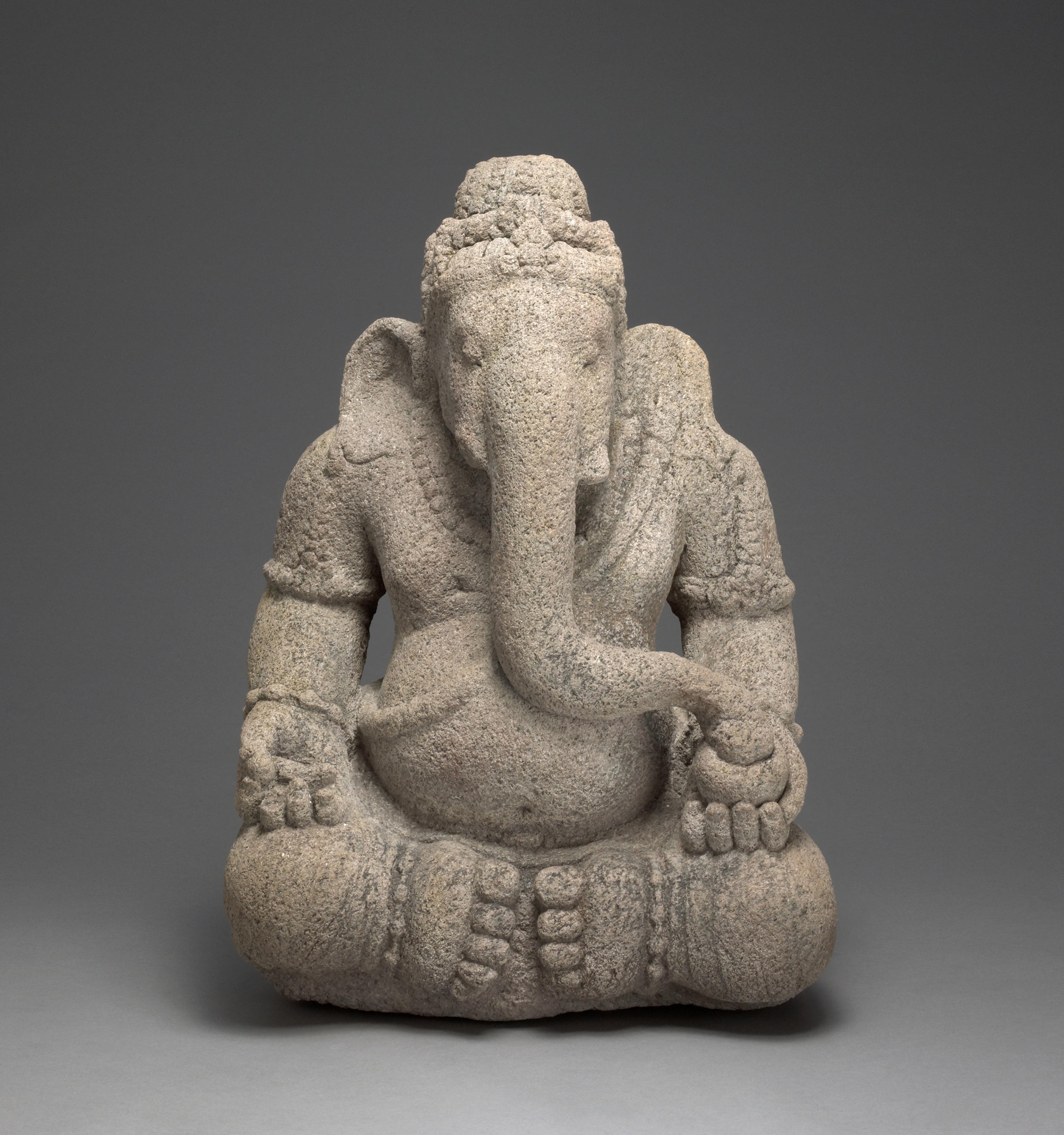
Unknown Indonedian/ Central Javaian Sculptor:
God Ganesha, Remover of Obstacles
(9th/10th century)
" … which explains my aching shoulder."
Publishing might qualify as a form of worship. Like all forms of worship, Publishing demands extended effort, as if Chiseling something out of stone, sculpting a practice from indifferent material. The practice itself needs to be coaxed into being using tools that should properly seem distinctly unsuited for their purpose, with straight edges intended to create curving lines and blunt instruments guiding the creation of fine edges. The outcome should seem unlikely from the outset and, if anything, even less likely as the faithful progress. This very difficulty feeds the resulting faith, encourages penitence, and sanctifies the practice. If it proved easy or convenient, it would prove worthless.
I mention this effort because the Amplified Collective revisited me yesterday.
Rededicating
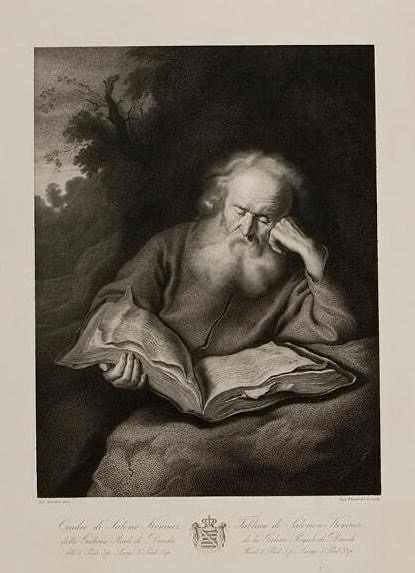
Christian Julius Gustav Planer,
After Philips Koninck: Hermit Reading (19th century)
"I might just as well be Rededicating my efforts …"
It doesn't take much to distract me. A tiny break in even a long-standing routine usually serves as more than an adequate impetus to go off my rails. I think of myself as a dedicated worker, but I seem to stand with one foot out the door, ready to divert my attention at the mere rumor of a hat dropping somewhere, anywhere. One might easily conclude that I lack an underlying discipline, and this observation might well prove both accurate as well as beside any useful point. Discipline should not be necessary and only prove essential in cases where one's held hostage, attempting to complete someone else's effort. Completing's one's own work should prove to enliven such that little discipline's demanded. I believe that if I'm focused on achieving my objectives, motivation should naturally take care of itself. That it only sometimes takes care of itself occasionally puts me at a distinct disadvantage.
The end of my Covid infection left me feeling ambivalent about Publishing, about everything.
BoogeyMens
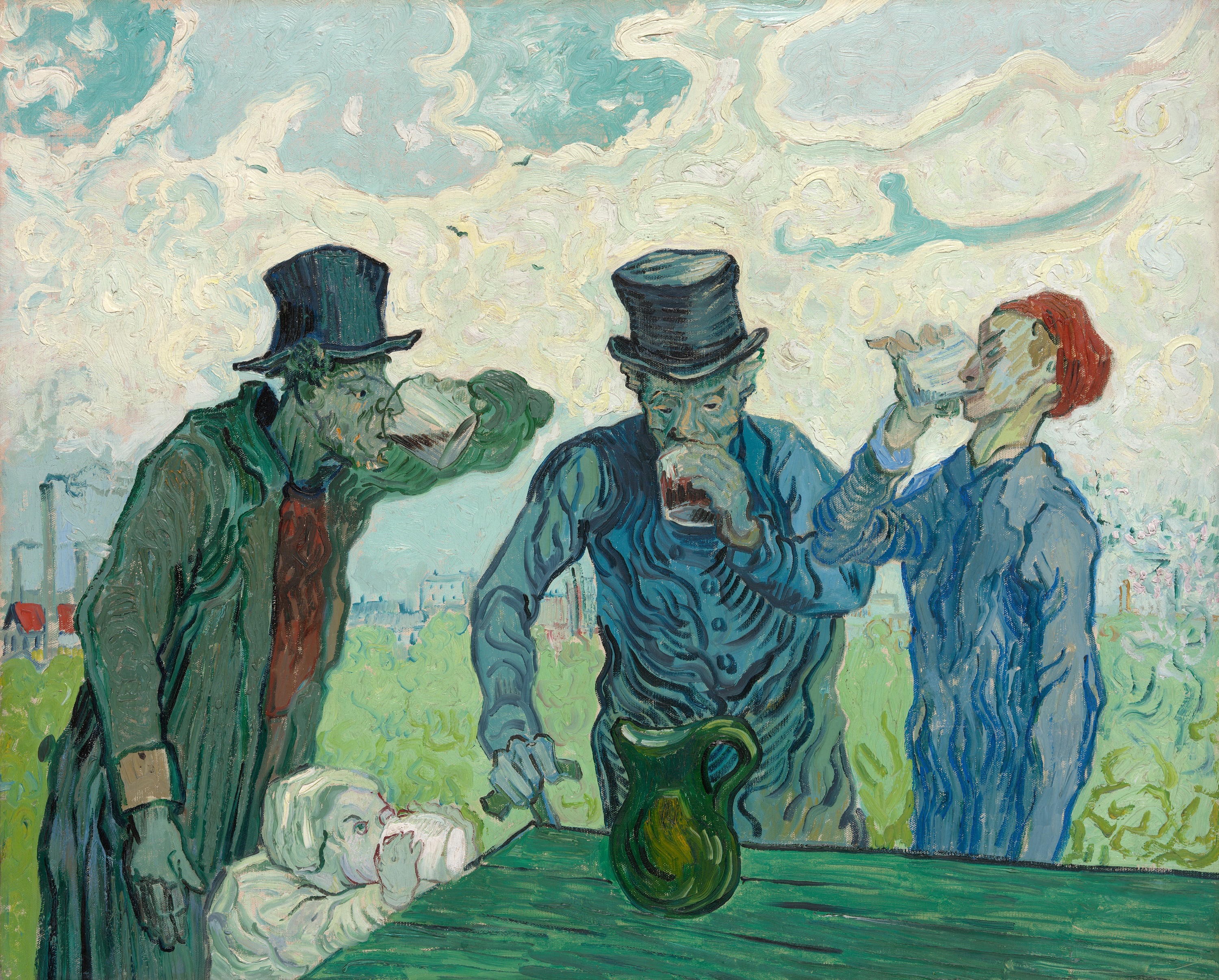
Vincent van Gogh: The Drinkers (1890)
“Our future seems secure together.”
Writing sometimes seems more like a haunting, for I am usually dredging up memories of past experiences to serve as grist for my work. I also sometimes exhume as yet unexperienced futures, and these can also prove to be problems. I imagine a few of my futures to be warm and inviting but more likely to harbor threats, many inhabited by BoogeyMens. The Boogeys remain from childhood stories rather than from lived experience. Their prior lives entirely consisted of stories, some of the types usually shared around a campfire on shadowy summer nights with a forest crowding in too tightly. Those stories promised an impending visit, scheduled for sometime between then and dawn. Later, some disturbance on the side of the tent will seem to announce doom's arrival, sparking some real drama inside. However, we almost always discovered the next morning some completely benign explanation for what we'd presumed had been our grisly demise. We'd somehow survived.
I've also somehow survived so far, though I often glimpse futures I would not willingly wish upon anyone, let alone myself.
FirstDrafting
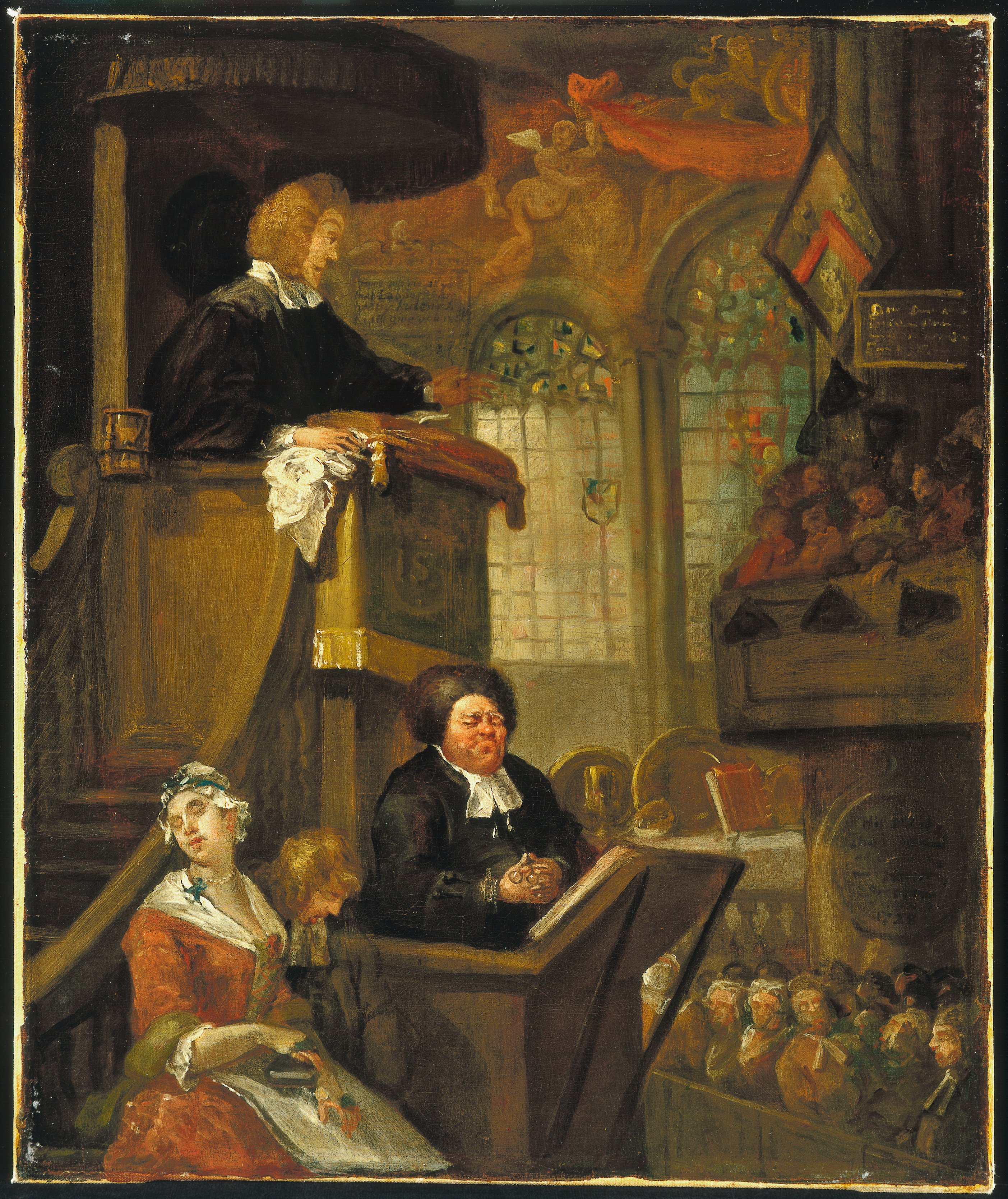
William Hogarth: The Sleeping Congregation (1728)
" … one must just keep going."
Try as I might, and I have been diligently trying, I cannot yet imagine the final form for anything I've been preparing for Publishing. I feel I have exclusively been FirstDrafting rather than final editing, though I suppose that I have been final editing. The feelings of finality have yet to kick in. I'm picking and poking at the manuscript and have not yet stumbled upon any central unifying theme. I acknowledge that central unifying themes tend to emerge rather than get engineered into anything, regardless of how cleverly anyone might attempt to engineer one. The period between initial idea and that theme's emergence might seem infinite when one finds oneself in the middle of an effort. Still, the sense that I'm merely scratching at some surface rather than anchoring my effort in bedrock unsettles this scribbler.
This middle space seems vast and trackless.
ReBeginningAgain
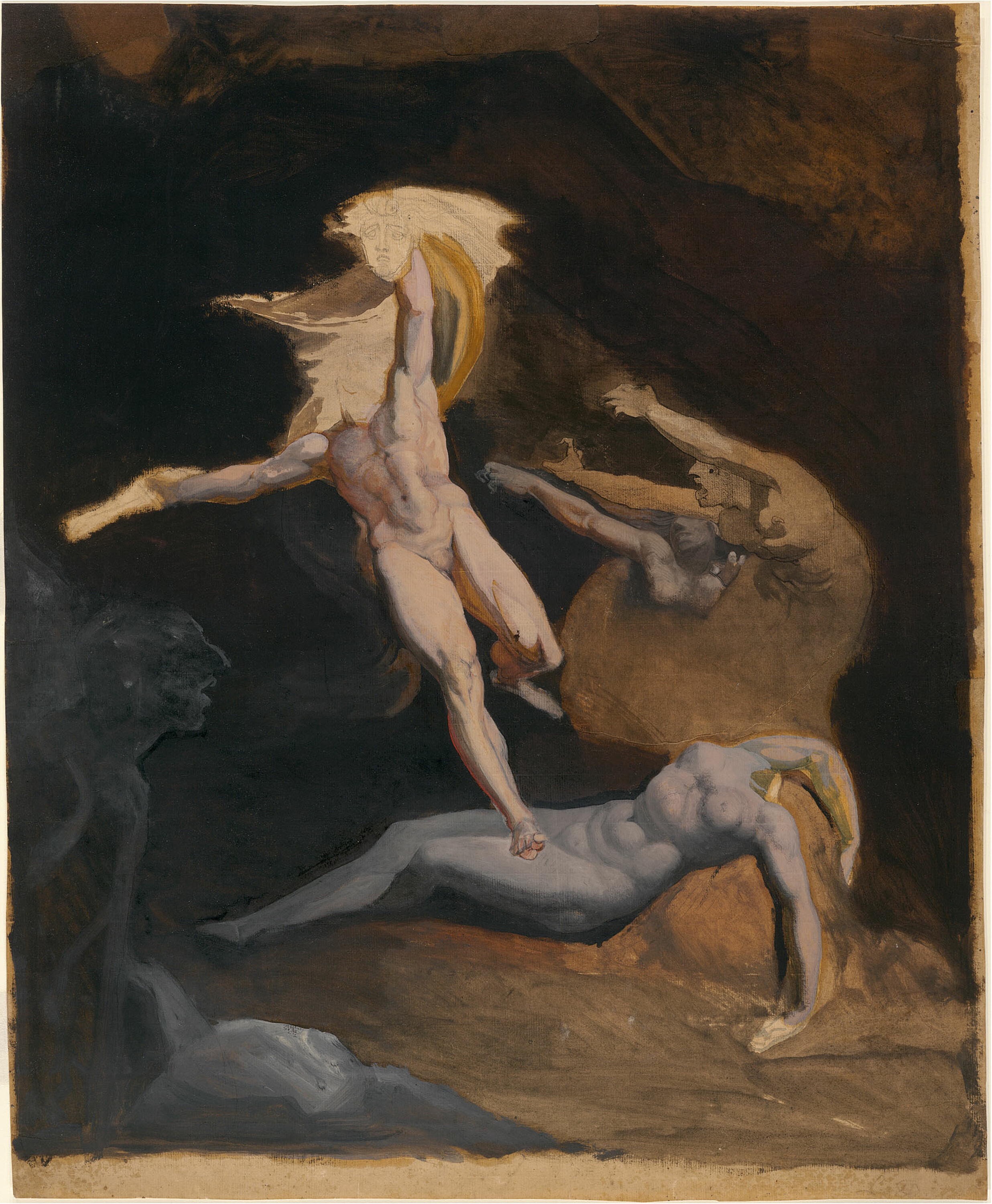
Attributed to Henry Fuseli: Perseus Starting from the Cave of the Gorgons (c. 1816)
"I should never again, ever be mistaken for anybody's spring chicken."
I somehow got the impression that beginnings and endings exclusively—or almost exclusively—came in matched pairs, with precisely one ending for each beginning and a single starting point for every ending. This notion could plausibly be further from the truth, but it needn't travel that far to expose its underlying fallacy. We've each seen multiple endings spawned from a single humble starting point, and many beginnings merge into a single ending. Commonly, something started finds itself interrupted, its routine disrupted, only to re-begin again; not usually to wholesale entirely start all over, but perhaps backtrack a little before trying to slip back into an established rut. These ReBeginnings always seem awkward, for it certainly seemed that the established routine had become well-engrained and unforgettable before the disruption. Some remembering with attendant struggling still seems evident. Nothing flawlessly re-begins.
Further, psychologists and metaphysicists insist that humans require disruption in their routines, however paradoxical this notion might seem.


